| Petition from the Pennsylvania Society for the Abolition of Slavery PDF |
|---|
| www.studenthandouts.com ↣ Texts ↣ Historical Documents |
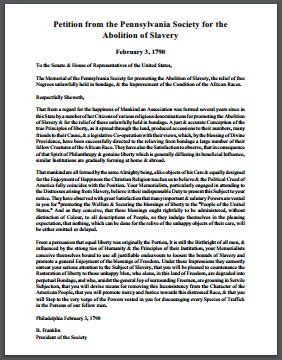 To the Senate & House of Representatives of the United States,
To the Senate & House of Representatives of the United States,The Memorial of the Pennsylvania Society for promoting the Abolition of Slavery, the relief of free Negroes unlawfully held in bondage, & the Improvement of the Condition of the African Races. Respectfully Sheweth, That from a regard for the happiness of Mankind an Association was formed several years since in this State by a number of her Citizens of various religious denominations for promoting the Abolition of Slavery & for the relief of those unlawfully held in bondage. A just & accurate Conception of the true Principles of liberty, as it spread through the land, produced accessions to their numbers, many friends to their Cause, & a legislative Co-operation with their views, which, by the blessing of Divine Providence, have been successfully directed to the relieving from bondage a large number of their fellow Creatures of the African Race. They have also the Satisfaction to observe, that in consequence of that Spirit of Philanthropy & genuine liberty which is generally diffusing its beneficial Influence, similar Institutions are gradually forming at home & abroad. That mankind are all formed by the same Almighty being, alike objects of his Care & equally designed for the Enjoyment of Happiness the Christian Religion teaches us to believe & the Political Creed of America fully coincides with the Position. Your Memorialists, particularly engaged in attending to the Distresses arising from Slavery, believe it their indispensable Duty to present this Subject to your notice. They have observed with great Satisfaction that many important & salutary Powers are vested in you for "promoting the Welfare & Securing the blessings of liberty to the "People of the United States." And as they conceive, that these blessings ought rightfully to be administered, without distinction of Colour, to all descriptions of People, so they indulge themselves in the pleasing expectation, that nothing, which can be done for the relive of the unhappy objects of their care, will be either omitted or delayed. From a persuasion that equal liberty was originally the Portion, It is still the Birthright of all men, & influenced by the strong ties of Humanity & the Principles of their Institution, your Memorialists conceive themselves bound to use all justifiable endeavours to loosen the bounds of Slavery and promote a general Enjoyment of the blessings of Freedom. Under these Impressions they earnestly entreat your serious attention to the Subject of Slavery, that you will be pleased to countenance the Restoration of liberty to those unhappy Men, who alone, in this land of Freedom, are degraded into perpetual Bondage, and who, amidst the general Joy of surrounding Freemen, are groaning in Servile Subjection, that you will devise means for removing this Inconsistency from the Character of the American People, that you will promote mercy and Justice towards this distressed Race, & that you will Step to the very verge of the Powers vested in you for discouraging every Species of Traffick in the Persons of our fellow men. Philadelphia February 3, 1790 B. Franklin President of the Society Click here to print. |
 | 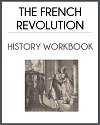 |
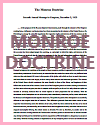 | 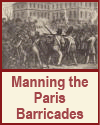 |
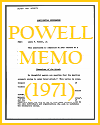 |
 |
| UNIT I: | Early America | UNIT IX: | Discontent and Reform | ||
| UNIT II: | Colonial Period | UNIT X: | War, Prosperity, and Depression | ||
| UNIT III: | American Revolution | UNIT XI: | New Deal and World War II | ||
| UNIT IV: | New National Government | UNIT XII: | Postwar America | ||
| UNIT V: | Westward Expansion | UNIT XIII: | Decades of Change | ||
| UNIT VI: | Sectional Conflict | UNIT XIV: | New Conservatism | ||
| UNIT VII: | Civil War and Reconstruction | UNIT XV: | Into the Twenty-first Century | ||
| UNIT VIII: | Growth and Transformation | UNIT XVI: | Polarization and Deglobalization |
| www.studenthandouts.com ↣ Texts ↣ Historical Documents |








